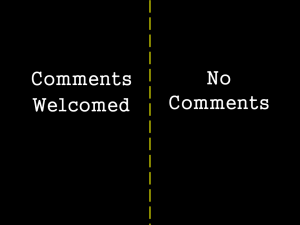A topic generating a great deal of conversation in the blogosphere lately is whether shutting off a blog’s comments feature is a prudent decision. The issue came to the forefront in March when Copblogger, a digital and content marketing company offering software and training services, pulled the plug on comments for its blog. The move raised eyebrows given Copyblogger’s position as a leading authority on the business of blogging. My initial reaction was one of incredulity- What do you mean you are eliminating comments? Isn’t reader comments a unique and powerful characteristic of blogging that sets it apart from other communication channels? My take was that someone had gotten “too big for their britches” as we would say growing up in Mississippi, that Copyblogger had marginalized the very people that made them relevant- their fans and followers.
Recently, I have heard and read thoughts from experts in the field including Chris Brogan, Mitch Joel, Mark Schaefer, and Michael Stelzner weigh the pros and cons of silencing blog comments. The more I learned and evaluated the question of whether to eliminate blog comments, I realized that there is no one-size-fits-all answer. In some situations, the decision to eliminate comments may be a course of action that can be justified. Specifically, three issues should be weighed by a brand (product or personal) weighing the benefits and costs of comments.
Exposure or Engagement
The first consideration pertains to why you are using a blog as a communication channel. Is its primary benefit that it offers wide reach to communicate in a cost effective manner, or is the reason for blogging to get feedback from your followers or customers? Blogs can evolve to become more of a pure content play, and the blog is the publication outlet for distributing thoughts or viewpoints. If having your audience participate in discussions or share their viewpoints is useful to your organization for learning and customer service, then allowing (and encouraging) comments is a no brainer.
Platform or Community
A second consideration also is related to blogging objectives- Is your blog a platform for promoting thought leadership, expertise, and products or a gathering place to nurture a community of people with similar interests? If your blog is a selling tool to build brand credibility, one-way flow of communication may adequately achieve your objective. The absence of side conversations or other distractions that could arise out of reader comments gives the blogger control over the topics and tone of conversations. But, if your blog creates value for you and readers because the power of community fosters learning among community members and by you, then shutting off blog comments would negate one of the main attractions of the blog to your audience.
Commerce or Conversation
Finally, the end goal of your blog impacts the significance of reader comments to blogging strategy. Consistent with using blogging as a channel for increasing brand exposure and as a platform to communicate brand authority and capability, turning off comments is practical when the aim of a blog is to drive prospects further into the sales funnel. If you are wanting to ultimately convert blog visitors, focus will turn to other tools to further the relationship. If the aim of blogging is to build trust and strengthen relationships among the community of readers, enabling comments is essential to creating the desired dialogue .
It Comes Down to Economics
The decision of whether or not to allow reader comments on a blog has compelling arguments on both sides. Rather than a clear cut yes/no response, the answer to this question truly is “it depends.” It depends on the three issues raised in this post as well as other considerations. Perhaps the most astute observation I have heard with regard to the issue of what to do about reader comments came from Mark Schaefer. He said the answer comes down to economics. If the cost to moderate and manage audience feedback via comments becomes too great relative to benefits received in terms of human resource and opportunity costs, then it may be time to eliminate reader comments. Until then, Schaefer sees the interactivity of the community worth the effort to moderate comments and actively respond to feedback from the community.

